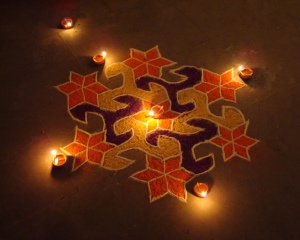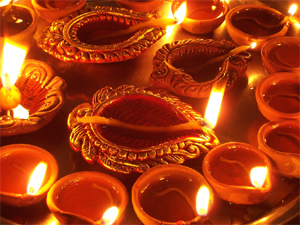It is as if a massive color palette fell on earth from the hand of the Almighty. The whole atmosphere is painted with bright colors—red, pink, yellow, blue, green, and purple. Young and old, men and women—all are soaked in colored water, running around, laughing loudly, shouting, and throwing mud on each other. It is a war where a water gun is your weapon, colored water is your bullet, and colored powder is your smoke screen.
The post A festival of colorful emotions appeared first on OUPblog.
Today is Diwali, a holiday otherwise known as the ‘Festival of Lights.’ In addition, it marks the beginning of the Hindu new year. Though primarily celebrated by Hindus throughout the world, Jainist and Sikh communities also observe this day. Diwali falls in October or November, depending on the Hindu lunar calendar and is a national holiday in countries with large Hindu populations, including India, Nepal, Sri Lanka, Myanmar, Mauritius, Guyana, Trinidad & Tobago, Suriname, Malaysia, Singapore and Fiji. The United States gave the holiday official status in 2007.

a rangoli or decorative design for Diwali
Diwali is a time to get together and celebrate with family and friends. Homes are thoroughly cleaned, elaborate outfits and fine jewelry are worn, and there is an abundance of food, especially sweets. There are many religious stories and myths associated with the holiday, the most recognized being Lord Rama’s return home from exile after a triumph over the demon Ravana. During Diwali, diyas are lit to celebrate the triumph of good over evil. Diyas are small candles made with a wick dipped in ghee or clarified butter in a clay or brass holder. Hindus place them inside their homes as well as outside on steps and in gardens, to welcome and honor the goddess of light and prosperity, Lakshmi, into their homes. The twinkling lights are symbolic of Rama’s goodness and victory over evil, as well as appreciation for good fortune in life.

diyas
When I was little I loved Diwali for all the pretty lights, festivities and sweets. Now, it’s all that plus the simple but powerful notion of celebrating and giving thanks for all of the good things I am fortunate to have. Whether you are Hindu or not, it’s a wonderful time to get together with those you love and think of all that’s bright in your life. Happy Diwali to all!
More Holidays
What does Ramadan celebrate?
What do Rosh Hashana and Yom Kippur celebrate?
Filed under:
Holidays Tagged:
Diwali,
diya,
Festival of Lights,
Hindu holidays 





